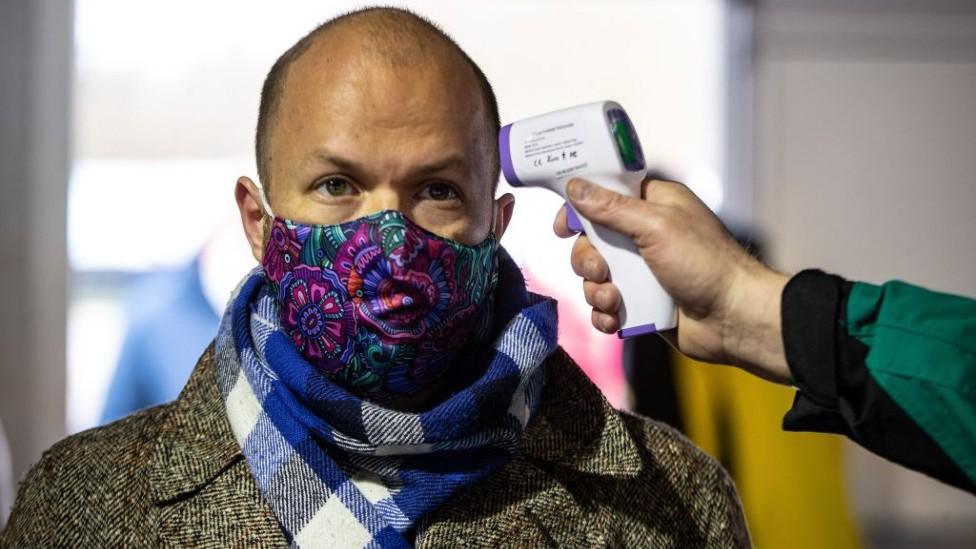Covid vaccines: EU tussle with UK over AstraZeneca escalates
- Published
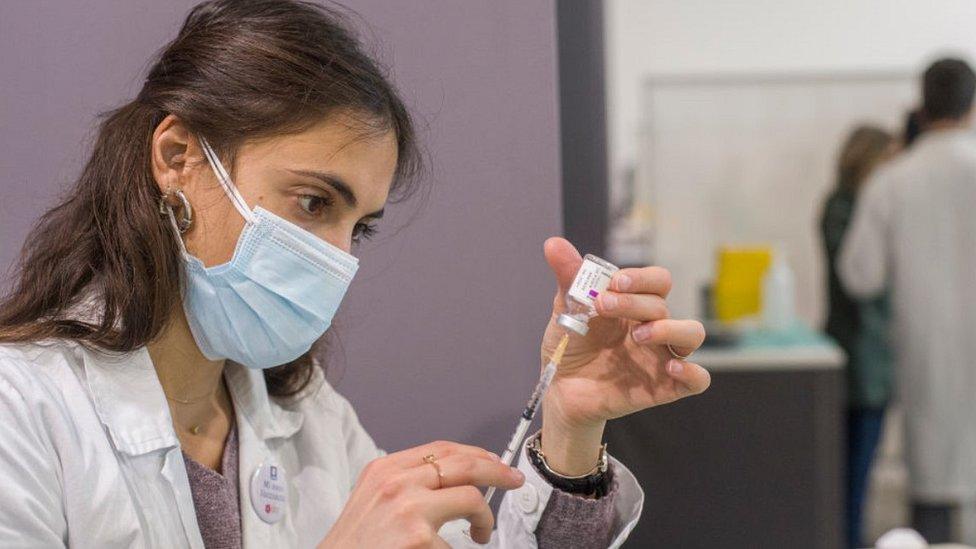
Italy was among EU countries which suspended, then resumed, AstraZeneca jabs over unfounded blood clot fears
"This is not about EU v UK. This is a problem with AstraZeneca," claimed an EU diplomat this morning.
He and I were discussing the latest thorny chapter in EU efforts to secure the Oxford-AstraZeneca jabs written into the bloc's contract with the Anglo-Swedish pharmaceutical company.
The debate is now focused on a production plant in the Netherlands, manufacturing AstraZeneca vaccines.
Boris Johnson is calling a number of EU leaders ahead of their meeting on Thursday, to try to ensure that AstraZeneca jabs - or components of jabs - produced in the Halix factory won't be blocked by the EU and kept from the UK.
EU officials say there has been no formal request by the UK for an export from Halix - yet.
But the already-existing cross-Channel strains surrounding the vaccine are infamous by now.
The EU insists AstraZeneca made different and contradictory promises to Brussels and to the UK in their respective contracts, signed last year.
They say the EU-AstraZeneca contract promised:
to ensure vaccine deliveries to the EU using production facilities in both the EU and UK
an assurance from AstraZeneca that it had no other contracts which could get in the way of it fulfilling its commitments to the EU
"Yet at the same time, AstraZeneca appears to have promised the UK priority for the first X million doses - using production facilities in the EU, as well as the UK. This doesn't add up. Though this isn't the UK's fault," concluded the first EU diplomat I spoke to this morning.
"If you include the 20 million AZ doses promised to us already in December, that's 120 million jabs we expected from AstraZeneca by the end of this month. If the EU sees 30 million of those, we'll count ourselves lucky," the diplomat snorted.
AstraZeneca denies that it is failing to honour its contract with the EU. It says the contract commits the company to making the "best reasonable efforts" - which, it says, it is doing, faced with production challenges.
Post-Brexit tensions
EU frustration with AstraZeneca has been boiling for months now.
And - whatever protestations you hear in Brussels to the contrary - there has been political spillage into EU attitudes towards the UK.
Don't forget: when the AZ delivery row with Brussels first exploded in January, the EU was still smarting from Brexit, bruising trade negotiations with the UK and ongoing bilateral frustrations around implementing the Brexit deal on Northern Ireland.
That seems to have given an extra dimension to the ire of many an EU politician, when AstraZeneca continued (until very recently) to apparently seamlessly deliver jabs to the UK, even while it defaulted significantly on pledges made to the EU.
UK officials point to jabs and digs they say have been made by EU figures. Attempts, they say, to undermine Britain's comparatively speedy and successful vaccine rollout.
EU leaders, like France's President Emmanuel Macron, are accused by some in the UK of seeking to undermine the Oxford-AstraZeneca jab because of its links with Britain.
Back in January Mr Macron described the AZ jab as "quasi-ineffective" in the over-65s. He then changed his mind, as the French government later approved the vaccine for the older population.
Others in the UK say they didn't appreciate it when the EU appeared to question the safety of the UK medical regulatory body granting emergency approval to the Oxford-AstraZeneca vaccine, while the EU chose a slightly longer approval process.


But EU politicians point the finger at the UK too. They accuse UK politicians and media of trying to score political points against Brussels, post-Brexit, using the vaccine rollout.
"The UK never dwells on the fact that the US has yet to approve the AstraZeneca jab," an EU official complained to me. "The criticisms are just about us (the EU)."
"There's so much post-Brexit triumphalism in the UK," complained a representative of another EU country.
"They often claim their vaccine programme would never have been such a success if it hadn't been for Brexit. But that's not true. Even if the UK had stayed a member state, it could have gone its own way over vaccines."
UK diplomats point to what they describe as the "more measured tones" of Prime Minister Johnson as regards vaccines and the EU. They insist that this is key as, they say, vaccine plans come from the "highest levels" of government.
As for the Halix plant in the Netherlands, the EU and Downing Street appear to be seeking some kind of compromise.
I'm told that talks are ongoing. A sign, say UK diplomats, that both sides are engaged in finding a solution.
The diplomats insist it's not in anyone's interest to have vaccines or vaccine components "sitting in a warehouse" when the aim - on both sides of the Channel - is to get needles into arms.
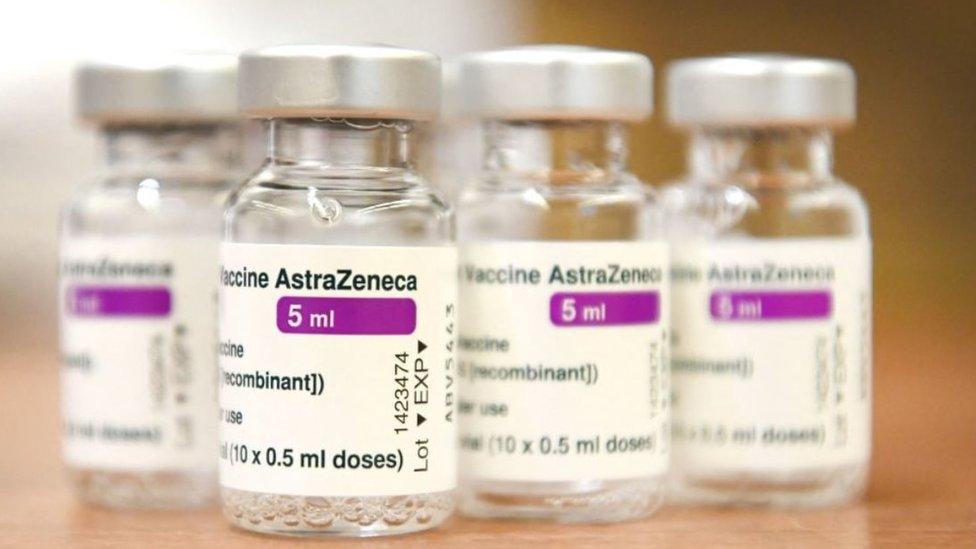
EU export ban?
The Halix plant in the Netherlands hasn't yet received an EU licence to deliver vaccines or components of vaccines to member states, although the European Commission says the green light is expected soon.
It's not clear what happened with the delivery of 250,000 AstraZeneca vaccines destined for Australia that Italy impounded a few weeks ago, with European Commission approval.
Current EU rules allow member states to bloc vaccine exports leaving the EU, if the company producing the doses has failed to fulfil its contract with the EU.
Officials in Brussels say right now that only applies to AstraZeneca.
Now the European Commission wants to get even tougher - possibly blocking exports of any vaccine produced in the EU, destined for a country outside that has its own vaccine production capabilities and a vaccine rollout considerably ahead of the EU.
Without mentioning the UK specifically, this would certainly apply to the UK.
EU leaders aren't united in favour of this latest Commission proposal, as is likely to become apparent during their summit on Thursday. Most say they would prefer a negotiated solution.
Why do new variants of Covid-19 keep appearing? BBC's health reporter Laura Foster explains
On Monday, Ireland's Prime Minister (Taoiseach) Micheál Martin said any EU restrictions on vaccine exports would be a "retrograde step" that could undermine the supply of raw materials for vaccine production.
Chief European Commission spokesman Eric Mamer said Brussels was not seeking to block exports, it was aiming to secure the vaccine supply it was promised. He said the EU was currently considering which tools to use to achieve that.
The Commission, meanwhile, has been blamed by many inside and outside the EU for making mistakes over EU vaccine procurement and production capacity.
It's been on the defensive of late. Attempting to promote the EU's reputation as the world's biggest single exporter of vaccines, it says 40 million doses were exported to 31 countries in just six weeks. With the biggest beneficiary to date being the UK which, says the Commission, received 10 million doses in that period.
"If you look at it that way," an EU diplomat said to me, "we (the EU) have contributed to the UK's vaccine success.
"If we are to find a solution over the Halix plant, it will have to involve reciprocity. So far we (the EU) have yet to receive a single dose produced in the UK, even though their rollout is so very far ahead of ours. Maybe the government could sell it as 'helping our European friends as we've done in the past'."
Of course, Boris Johnson is under huge public pressure to continue the successful vaccine rollout at home.
Political pressure is building heavily on Brussels and individual EU governments to improve their vaccine rollout. Fast.
The EU lags far behind the UK and the US, just as a pernicious third wave of the pandemic is hitting a number of countries.
Germany on Monday is considering extending and even tightening lockdown restrictions. Italy will shut down the country for three days over Easter. Central and Eastern Europe have some of the highest coronavirus-linked death rates in the world.
The European Commission still insists the majority of adults in the EU can be vaccinated by the end of summer; that vaccine supply in the EU will increase exponentially come April.
But the EU vaccine challenge is not solely supply. It's demand - or trust - too.
Many in the EU were always more vaccine-wary than their UK counterparts.
EU leaders' on-again-off-again relationship with the AstraZeneca jab hasn't helped.
The latest scare centred around fears of a side-effect of blood clots in the brain.
The European Medicines Agency ruled the vaccine safe after an investigation, but the incident set vaccine rollouts back further in at least 15 European countries.
It seems to have undermined already patchy public confidence too.
A new survey by YouGov, external suggests that fewer than half of Spaniards, Italians, French and Germans judge the AstraZeneca vaccine to be safe, despite evidence to the contrary.
That said, the EU countries that most rely on the AstraZeneca vaccine for their populations are the countries of Central and Eastern Europe, including Austria.
At the EU leaders' summit on Thursday they'll be pressing for solutions.
- Published18 January 2021
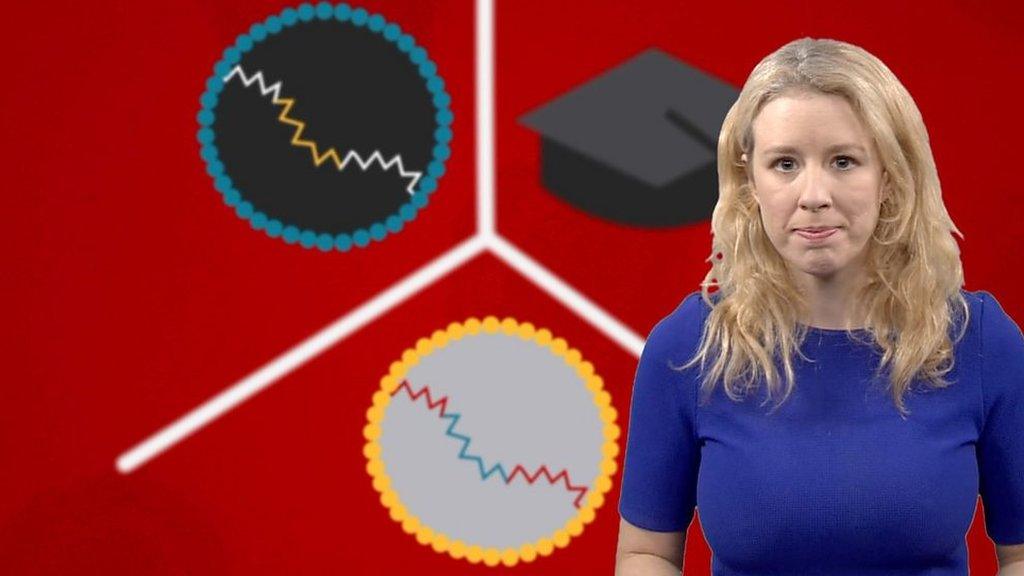
- Published22 March 2021
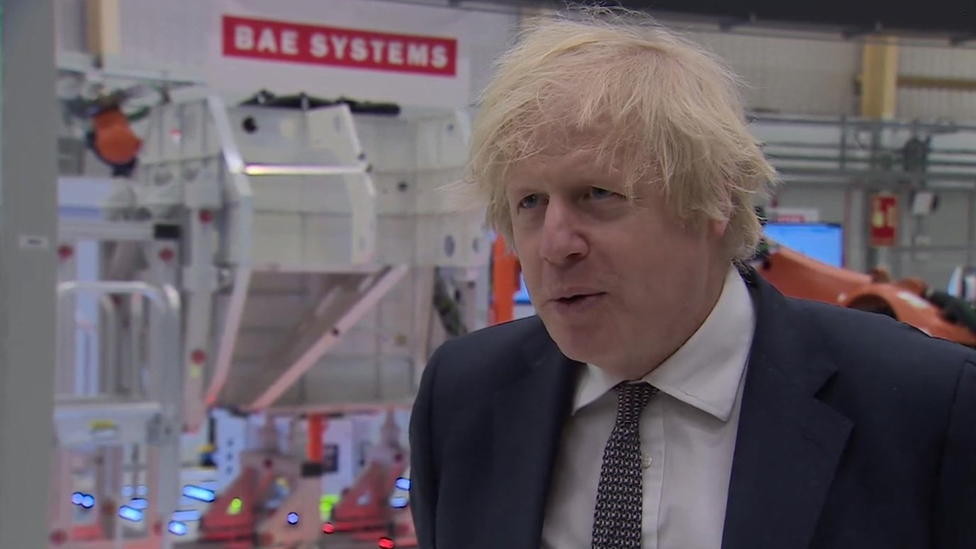
- Published21 June 2021
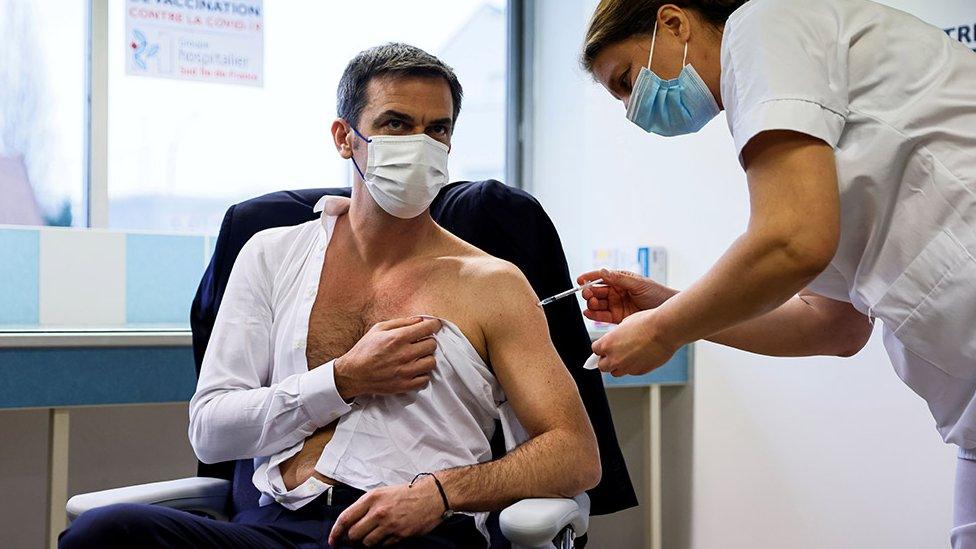
- Published22 March 2021
